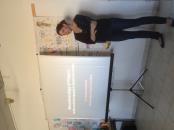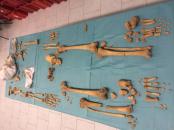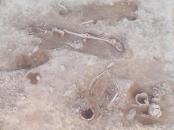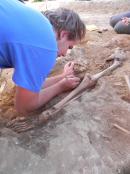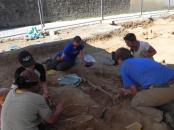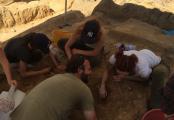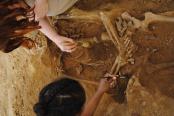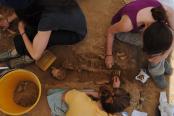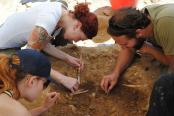CAMPAGNA 2015 |
1° SETTIMANA |
2° SETTIMANA |
3° SETTIMANA |
4° SETTIMANA |
5° SETTIMANA |
6° SETTIMANA |
26 GIUGNO 2015 
Resoconto della giornata di scavo
Area 2000
In questa giornata è stato completamente esposto e rimosso Usk 2521 all’interno del taglio sepolcrale Us -2528, situato nella porzione centro orientale dell’allargamento ovest. Lo scheletro è orientato Nord Sud e si preservano esclusivamente gli arti inferiori paralleli, con l’assenza del piede e di metà della tibia e della fibula sinistra e del bacino destro; a fianco della tibia destra è stato rinvenuto un grano di rosario. Nella porzione nord occidentale è stato individuato il taglio US-2530, avente una forma ellissoidale abbastanza regolare e orientato Nord Sud, afferente a una sepoltura secondaria dove sono stati rinvenuti due tibie, due femori, alcune falangi e frammenti di un cranio (US 2531). E’ presumibile che molti degli individui intercettati e disturbati per far spazio alle sepolture più recenti, in seguito siano stati o ridotti o riseppelliti all’interno di ossari appositamente creati come forma di rispetto religioso. Nella porzione centrale prosegue la messa in luce dell’individuo prono Usk 2519, del quale risultano conservati anche la tibia, la fibula ed il piede destro, la colonna vertebrale e l‘arto superiore destro flesso sotto l’addome. Nell’angolo Sud occidentale è stata individuata un’ulteriore fossa (US-2535), orientata Ovest Est, dove all’interno è deposto USk 2537; si tratta di un individuo adulto, deposto supino, con il cranio in norma laterale destra e gli arti asimmetrici (il destro disteso e il sinistro leggermente flesso sul bacino), probabilmente decomposto in spazio vuoto come suggerirebbero l’apertura del costato (malamente preservato), la rotazione laterale degli omeri e una parziale disconnessione del cranio. Poco più a Sud è stata riscontrata la presenza di una fossa sepolcrale (Us -2533) che prosegue al di sotto di Usk 2537, che sarà scavata a partire dalla prossima settimana.
After we uncovered the site, we continued excavation on the right leg of the prone skeleton, USk 2519, exposing the right tibia, fibula, tarsals and metatarsals. Also found was the articulated vertebral column and right ulna and radius, located underneath the vertebrae. It seems like the individual was buried prone with the right arm slightly flexed underneath the body. We began excavation on the articulated foot in USk 2531, a reduction area with two crania and a mandible. USk 2531 is likely a secondary burial. A crania and ribs were uncovered today and labeled USk 2537. A skeletal context sheet was completed for USk 2531 and a stratigraphic context sheet was filed for the associated cut -2530 and fill 2532. A nail was found associated with 2531, possibly suggesting the presence of a board commonly put over the upper half of the body, but this is yet to be confirmed. Also exposed by during excavation today was the left foot of USk 2521, not articulated with the fragmented left tibia. After pictures were taken of USk 2531 and 2521, a skeletal context sheet was completed for USk 2521 and the skeleton was then removed. All fill layers associated with 2521 and 2531 were removed to better reveal the cuts, which was then photographed. The exposed USk 2519 was also photographed at this time. The next day of excavation we will likely focus on removing 2519 and further removing the 19th century stratigraphic layer.
Area 3000
Today in Area 3000, we excavated a grave that had thus far appeared to only contain scattered bones. However, deeper within the fill, we found many bones in connection including vertebrae, the right humerus, the right os coxa, the right femur, and right patella. We will continue uncovering these bones tomorrow to see how complete the skeleton is. In the middle of the eastern section of area B, we continued excavation of the half skeleton. We filled out the context sheet and began to put the bones in bags. We also took a sample of the fill from underneath the right oscoxa. We hope to finish excavation of this skeleton next week.
Area 5000
Today in area 5000 soil samples were taken on all the exposed possible burn features throughout the site. Each burn feature was measured as well. GIS elevations were taken on both exposed walls and all of the fire points. After that, the dark soil strip, which we hypothesize to be wall fill, was trenched out over its entire length. It was cleaned and exposed, and a small pit was dug out on the portion of the wall that intersects the wall from area 3000. Then beginning in the south western corner, near the mortar pit that was exposed in the previous season, we began taking the site down a layer. The excavation continued a few meters to the north, before the end of the work day.
Area 6000
Come nelle giornate precedenti prosegue la messa in luce della trincea di drenaggio US -6007 con la relativa esposizione dei fronti verticali tagliati di US 6001 ed US 6002.
Much like the previous two days, the five of us in Area 6000 continued to work in the trench, however, we did not pick-axe as hard as we did the previous days. Instead, we troweled the edges to clean and expose the boundary made by the cut. Also, we lightly pick-axed to expose the interface between 6002-6001 and 6002-6003. Within the fill, we found bone fragments including an intact os coxa and talus as well as a funeral shroud pin, a piece of glass, a coin, and small pieces of pottery. Next Monday, the area will be dampened with water to determine the soil colors along the sections and fully outline bones and other important features.







